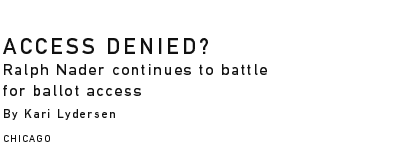 
|

|

|

|
| |
|
|
|
With less than two months before the election, Green Party presidential candidate Ralph Nader and running mate Winona LaDuke are on the ballot in 44 states and the District of Columbia. The Nader campaign is continuing legal battles for ballot access in the remaining states, with the added goal of opening up the electoral process to future third-party candidates. Nader campaign leaders say the difficulty they've had getting on the ballot in many states shows the extent of the stranglehold the two major parties have on the democratic process. Legislation mandating the number of signatures required, the date by which they must be submitted, and the process by which they are verified and challenged makes it an uphill battle for a third-party candidate to get in the fray. In Indiana, Idaho, North Carolina, South Dakota and West Virginia, lawsuits have been filed in state and federal courts challenging obstacles to ballot access for third parties. The lawsuits address regulations such as "absurdly small windows of time for filing, excessively high numbers of signatures required and unnecessarily complex verification procedures," says Nader 2000 press secretary Laura Jones. In North Carolina, for example, 51,324 signatures are required to get on the ballot. But many other states have comparatively few restrictions. Washington State requires 200 signatures, and Tennessee needs only 25. In Louisiana, all that is required is a $500 filing fee. Campaign field manager Todd Main says that 14 states require more than 10,000 signatures, 19 states require between 2,000 and 5,000 and the remainder ask for fewer than 2,000. In Wyoming and Georgia, Nader's name will not be listed on the ballot, but campaign workers are urging voters to write him in on election day. Oklahoma is the only state where there is little chance of Nader getting any votes; the state doesn't allow write-in campaigns, and the Green Party was unable to get the required number of signatures by the filing deadline. "You need 36,000 signatures in Oklahoma," Main says, "which is the highest per capita requirement of any state." The campaign lost a court case challenging Oklahoma's requirement, but may file an appeal. In Illinois, the Nader campaign won a lawsuit challenging an "unreasonable and unconstitutional filing deadline," Main says. Last year South Dakota and Illinois had moved their filing deadlines back from August to June, but the courts later awarded the Greens an extension to get their signatures in. The Illinois Democratic Party then challenged the validity of about 10,000 of the 39,000 signatures. As In These Times went to press, Nader campaign workers were going through the signatures line by line to defend them in front of the Illinois Board of Elections, and a decision was expected soon. "We'll survive this challenge," Main says. "Illinois is a big one for us." Main claims that the notorious Chicago Democratic machine is "definitely" behind the signature challenge. William Daley, brother of Chicago Mayor Richard Daley, heads Al Gore's campaign. "This is a transparent, machine-run effort to keep us off the ballot," Jones says. "It's an absurd waste of resources. It's a great example of the efforts to which people will go to squash this campaign." The Nader campaign, which includes 45 paid staff and more than
100,000 volunteers nationwide, hopes its efforts will make campaigning
easier for future third-party candidates. "All our lawsuits are
meant to open up the democratic process for our candidate," Jones
says, "but also for candidates to come."
|

